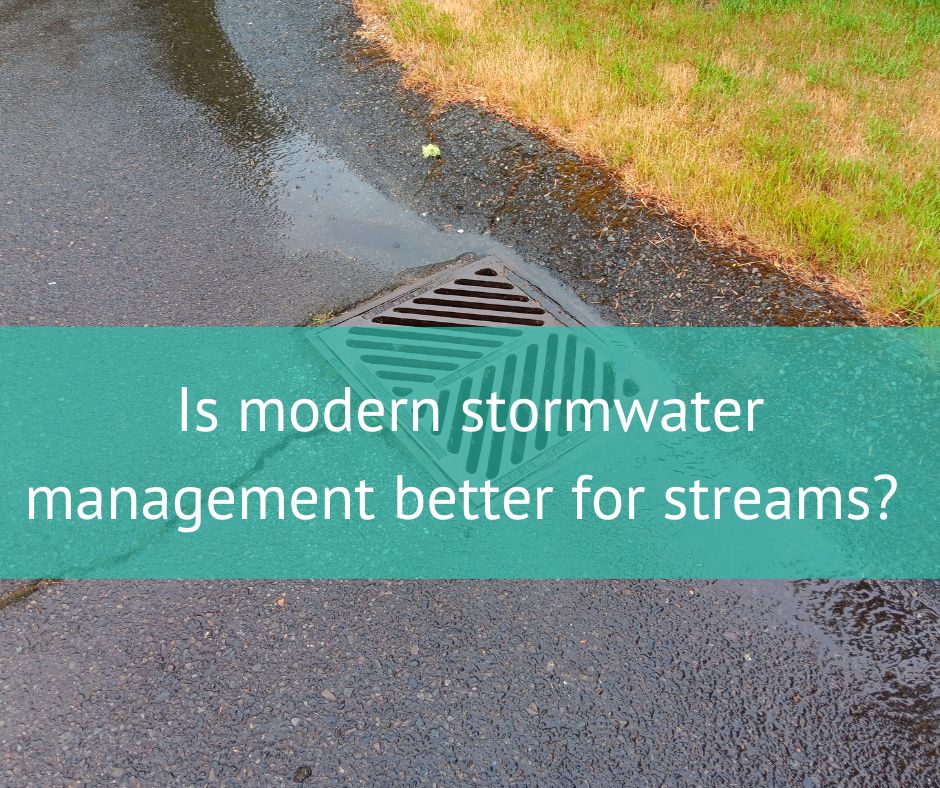King County’s Department of Natural Resources and Parks recently completed an analysis of existing data to assess how past stormwater management may have affected freshwater quality. Their analysis suggests that the period of time in which urban development occurred is a good indicator of potential water quality impacts on aquatic species.
More...
While more study is needed to link and quantify the water quality changes due to specific stormwater management practices or policy changes, the “results suggest efforts to minimize impacts of development may have been somewhat successful.” Stormwater pollution is complex and it can be very challenging to connect water quality changes with stormwater management activities. It is encouraging to see tangible results that reinforces we are doing the right things and the investments made in Puget Sound stormwater management is changing our approach to urban development.
It can be difficult to assess the cumulative clean water impacts of stormwater policies and programs over time. In this case, King County assessed 26 laws, policies, and other regulatory interventions between 1948 and 2019. 12 of these were King County specific. The researchers found that since 2002, BIBI scores had improved in 33% of sites they had been monitoring, and declines in only 2%.
"We consider the project a success, although we did not accomplish all that we had initially proposed. Although we couldn’t answer one of the original questions, we were able to evaluate if the timing of development explained some of the variation in stream conditions and B-IBI scores. We were able to use high resolution land cover data and assessor’s office data in a new way to answer an important question in a novel way. The results suggest that the efforts over the last several decades have reduced the relative impacts of development, which is encouraging.” – King County
Active precautionary stormwater management seems to be effective for newer developments. However, there remains a strong, negative response of aquatic communities to increased impervious surfaces. These results tell us two important things for the future of Puget Sound:
- Science-based stormwater policies are going in the right direction to reduce ecological harm, and
- We need to strengthen these investments to protect water quality as our region continues to grow and develop rapidly.
How does this support Puget Sound recovery?
This project supports Puget Sound Recovery by adding to our body of knowledge regarding urban development regulations, and statistically stating that newer urban development (with more environmentally conscious regulations) is less harmful than older urban development. Local urban planners and stormwater practitioners can reference this information to support improved stormwater management for newly developing areas and to retrofit legacy stormwater infrastructure.
The Stormwater Strategic Initiative Lead Team (Stormwater SIL), with input from its standing advisory team, has funded three additional BIBI related projects including the use of BIBI supplementation (adding bugs), next phase protection and restoration in select BIBI basins, and Timber Harvest and BIBI Impacts. King County has been a leader in BIBI monitoring and analysis via the Puget Sound Benthos network.
The Stormwater SIL developed the freshwater B-IBI Implementation Strategy, to inform and guide Puget Sound recovery efforts under the Puget Sound Action Agenda. Stormwater is one of the most significant pathways and sources of pollution to Puget Sound. Municipal stormwater is regulated by the U.S. EPA and the Washington Department of Ecology under the federal Clean Water Act and the State Water Pollution Control Act, and requires stormwater management actions for most cities and counties in Washington State. Local stormwater programs depend on new research and analysis to make sure the investments made will result in improved water quality and environmental health.
Where can I find more information?
King County’s report, “Impact of Urban Development on Stream Macroinvertebrate Communities is Influenced by when Development Occurred” and other supporting material can be found on this webpage.
This project has been funded wholly or in part by the United States Environmental Protection Agency under assistance agreement PC-01J95801-2 to the Washington State Department of Ecology. The contents of this document do not necessarily reflect the views and policies of the Environmental Protection Agency, nor does mention of trade names or commercial products constitute endorsement or recommendation for use.

